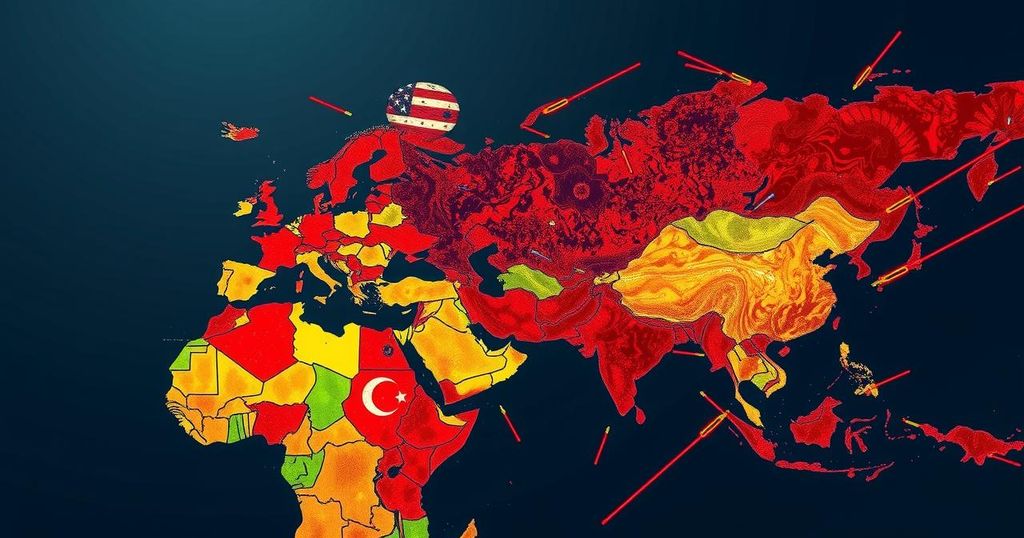This article highlights recent developments including the Netherlands’ strict asylum measures following a spike in applications, deadly violence in Sudan escalating the humanitarian crisis, a large protest in South Korea against LGBTQ+ rights, China’s condemnation of a U.S. arms sale to Taiwan, and Bulgaria’s ongoing electoral complexities.
The Dutch government has implemented stringent measures aimed at regulating migration, signaling a significant shift in its asylum policies. This decision comes on the heels of 51,000 asylum applications filed in the previous year. Among the changes are heightened border checks, the cessation of mandatory municipal resettlement for asylum seekers, and restrictions on family reunification. This trend mirrors similar movements in Italy, Sweden, and other European Union countries, which are increasingly adopting stricter immigration policies. In Sudan, a violent assault carried out by the Rapid Support Forces has tragically resulted in at least 124 fatalities in Al-Sareeha village. The attack also left over 200 individuals injured and about 150 others detained, underscoring the intensifying conflict between the RSF and the Sudanese Armed Forces. This escalation has exacerbated a humanitarian crisis, with millions displaced. In South Korea, a substantial protest orchestrated by Christian groups took place in Seoul, opposing a recent court ruling that allows spousal health benefits for same-sex partners. Demonstrators claimed that over a million people participated, while local police estimated the turnout to be around 230,000, indicating significant public sentiment regarding the ongoing discussions surrounding same-sex marriage. China has expressed its discontent over a recent $2 billion arms deal between the United States and Taiwan, marking the 17th such transaction under the Biden administration. Chinese authorities have vowed to undertake “countermeasures” in response, stating that the deal undermines Sino-American relations and threatens regional stability, especially in the Taiwan Strait. In Bulgaria, early indications from exit polls reveal that Boyko Borisov’s GERB party may lead in the nation’s seventh election within three years. However, the prospect of coalition formation remains uncertain, especially following a hung parliament in the last election. The pro-Russian Vazrazhdane party reportedly underperformed, while the Reformist PP-DB garnered unexpected support. Final election results are anticipated to be released on Monday.
The article discusses critical global issues reflecting current sociopolitical tensions within various nations. In the Netherlands, the rise in asylum applications has prompted the government to adopt harder policies similar to those enacted across Europe, underscoring a widespread pivot towards immigration control. Sudan is facing a dire humanitarian crisis marked by violent conflict, highlighting the fragility of peace in the region. South Korea is grappling with social issues regarding LGBTQ+ rights, exemplified by public protests against judicial rulings. China’s reaction to U.S. arms sales to Taiwan reiterates ongoing geopolitical conflicts in Asia, with potential repercussions for international relations. Lastly, Bulgaria’s parliamentary elections illustrate the complex dynamics of its political landscape, revealing the challenges of coalition governance in a fragmented electoral environment.
In summary, the article outlines significant geopolitical and social developments across various countries. The Netherlands’ migration policy shift reflects a broader trend in Europe toward stricter asylum controls. Sudan’s escalating violence sheds light on its humanitarian crises. South Korea’s protests indicate societal divisions regarding LGBTQ+ rights. Furthermore, China’s condemnation of U.S. arms support to Taiwan signals tensions in Asian geopolitics. Finally, Bulgaria’s electoral challenges underscore the intricacies of coalition-building in a politically fragmented environment.
Original Source: www.gzeromedia.com






